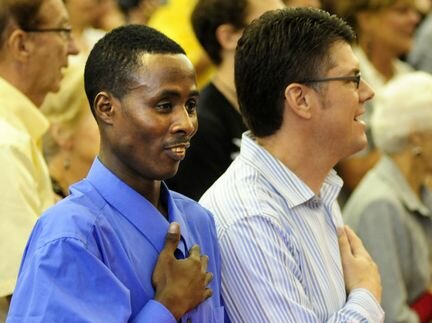 Bartamaha (Nairobi):- For Mohamed Mamow, this day could produce but one result: A smile to light the world.
Bartamaha (Nairobi):- For Mohamed Mamow, this day could produce but one result: A smile to light the world.
“I am very excited. I am very so happy,” said Mamow, 31, a Somali refugee who escaped death and war to take the oath of citizenship Wednesday at Gerald R. Ford Presidential Museum with dozens of other new citizens.
His emotions were understandable.
He followed his brother, Aweys Mohamed, a fellow refugee who earned his citizenship in August 2009. They settled in West Michigan in 2004 after 12 years in a Kenyan refugee camp.
The brothers fled civil war in Somalia in 1992, watching as boys while armed men shot their father, sister and brother-in-law.
It is no surprise, then, that to live in America to Mamow is still a dream. He counts the ways.
“This country is free. It is a safe place. Here you can go to school.
You can work.”
He is among several hundred Somali Bantu to settle in West Michigan according to refugee resettlement officials. Some 13,000 have settled in the United States.
“It’s pretty remarkable,” said Chris Cavanaugh, refugee resettlement program coordinator for Lutheran Social Services of Michigan.
“To be able to survive what they survived, you have to put a value on that. That’s why they make good citizens.”
While some are still struggling to find their way, Cavanaugh the majority are adjusting to life in West Michigan.
They remain a relatively self-contained community, perhaps due to a shared legacy of oppression that dates back multiple generations.
Indeed, theirs is a story of slavery, discrimination and finally a flight for life as civil war engulfed their rural homeland in southern Somalia..
Many of the Bantu were brought in the 19th century as slaves to Somalia from what is now Tanzania, Malawi and Mozambique. Though slavery was formally ended in the early 1900s, many Bantu were compelled by the Italian colonial government to work on labor brigades.
They were denied education. Much like blacks in the American Jim Crow south, they were marginalized and relegated to second-class status by most of Somali society.
The civil war added a layer of brutality to their ordeal, as they were attacked for food, raped and murdered.
Mamow and his brother stood helpless as militiamen descended on their village, demanding their father turn over extra food and money they thought he had hidden. He told them he had none. He was shot.
They turned to their sister and brother-in-law and demanded that his brother-in-law rape their mother. He refused. They were both shot.
Fleeing their village, the brothers joined their mother and other family members in a week-long trek to the border with Kenya and the refugee camp that would be home for a dozen years.
“We walk day and night. No food. No drink,” Mamow recalled.
In that camp, Mamow said, marauders would come at night and demand food or anything of value they might have. They often ran short of their United Nations food ration.
But it was also there he met his wife, Shani Abdi, 29, whom he would marry in the camp. They have five children, ranging in age from 10 months to 10 years.
American commerce remains a marvel to Mamow, who lives in a Grand Rapids townhouse a few blocks from Woodland Mall.
“It is beautiful. A lot of stores,” he says of 28th Street.
He is adjusted to Michigan weather, though his first taste of winter was a jolt.
“It was too much, too heavy,” he said.
Given the deprivation that defined so much of his life, Mamow takes little for granted.
He arrives for his job as a machine operator at a Wyoming packaging plant a half-hour early each day. He tends to every detail on his shift, mindful of the responsibility he bears to his family.
He can be so serious about his job that co-workers sometimes tease him for it.
“I don’t like to lose my job. That is why I am serious. I have a responsibility for my children and my family.”
An executive at Profile Industrial Packaging Inc. turned up at the ceremony in support of Mamow.
Bill Ehmann, vice president of operations, said Mamow is well-known for a work ethic that goes with his habitual smile.
“He is an extremely hard working employee. All of us at Profile are very fond of Mamow.
“He is a reminder to all of us that we are really blessed.”
—————————————————
Source:_The Grand Rapids Press



